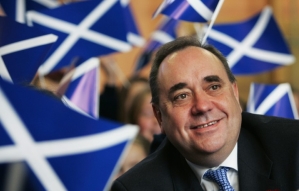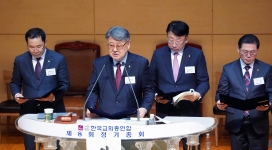
Alex Salmond, who led Scotland's failed bid for independence, announced on Friday that he would step down as first minister and as leader of the Scottish National Party later this year. The announcement came the day after voters decisively endorsed continued union with Britain.
Mr. Salmond was by far the most prominent casualty of his party's defeat after an independence campaign that sent shock waves through Britain's political elite, energized Scottish politics as rarely before and appeared to open the way for a looser, more federal Britain.
With results tallied by early Friday from all 32 voting districts, the "no" campaign won 55.3 percent of the vote. The margin of victory was greater than nearly all pre-election polls had forecast, according to The New York Times.
"Today the point is this," Mr. Salmond said in a statement hours later. "The real guardians of progress are not the politicians at Westminster, or even at Holyrood, but the energized activism of tens of thousands of people who I predict will refuse meekly to go back into the political shadows." Holyrood is the area of Edinburgh where the Scottish Parliament has its headquarters.
"For me right now, therefore, there is a decision as to who is best placed to lead this process forward politically," Mr. Salmond said. "I believe that in this new, exciting situation, redolent with possibility, party, Parliament and country would benefit from new leadership."
He said that he would not stand for re-election as leader at his party's annual conference in November, and that he would stand down as first minister "to allow the new leader to be elected by due parliamentary process," according to The New York Times.
But Mr. Salmond seemed to suggest that the campaign for a sovereign Scotland was far from over. "The position is this: We lost the referendum vote, but can still carry the political initiative," he said. "More importantly, Scotland can still emerge as the real winner."
His decision to step down, after earlier suggestions that he would stay on whatever the outcome of Thursday's referendum, reflected the deep disappointment within the vocal, enthusiastic pro-independence movement on Friday. Mr. Salmond's followers had seen an opportunity to make a centuries-old nationalist dream a reality, and the momentum they built in the referendum campaign forced the three main British parties into panicked promises that they would grant substantial new power to the Scottish Parliament.
The voters' decision spared the British prime minister, David Cameron, a shattering defeat that would have raised questions about his ability to continue in office and would have diminished his nation's standing in the world, according to The New York Times.
Before announcing his plans to resign, Mr. Salmond insisted that the 1.6 million people who voted for independence on Thursday showed the depth of yearning for the political powers promised to Scotland by British political leaders to stave off disunion.
"Scotland will expect these to be honored in rapid course," said Mr. Salmond, while promising to work to heal the divisions the referendum created.
The campaign to keep Scotland within the United Kingdom secured just over two million votes, providing what Mr. Cameron took as a mandate for broader changes affecting all four components of the United Kingdom - England, Scotland, Wales and Northern Ireland, according to The New York Times.
"The people of Scotland have spoken, and it is a clear result," Mr. Cameron said outside 10 Downing Street in London after Mr. Salmond conceded defeat just after dawn. "They have kept our country of four nations together. As I said during the campaign, it would have broken my heart to see our United Kingdom come to an end."
Mary Pitcaithly, the chief counting officer for the referendum, said final figures showed the pro-independence camp securing 1,617,989 votes while their opponents got 2,001,926.
The campaign injected a rare fervor and passion into Scottish politics, as independence was debated in bars and coffee shops, kitchens and offices, and produced a turnout that exceeded 90 percent in some districts. Across Scotland, 84.6 percent of eligible voters cast ballots.
But while the outcome was decisive, it brought a sense of new uncertainty over what would follow, according to The New York Times.
The vote preserved a union molded in 1707, but it left Mr. Cameron facing anger among some lawmakers in his Conservative Party over the promises of greater Scottish autonomy that he and other party leaders made in the final days before the vote, when it appeared that the independence campaign might win. Some lawmakers called for similar autonomy for England itself, and even the creation of a separate English Parliament.
The outcome headed off the huge economic, political and military imponderables that would have followed a vote for independence. But was unlikely to deter Scottish nationalists from trying again.
Mr. Salmond called for reconciliation after a vibrant exercise in democracy that had episodes of harshness and even intimidation. But he seemed to couple his call for unity with a signal that the broader campaign for sovereignty, which he has fought for decades, was not over, according to The New York Times.
"Today of all days, as we bring Scotland together," Mr. Salmond said early in the day, "let us not dwell on the distance we have fallen short. Let us dwell on the distance we have traveled and have confidence the movement is abroad in Scotland that will take this nation forward."
President Obama had made little secret of his desire that the United Kingdom remain intact. Indeed, Britain has long prided itself on a so-called special relationship with the United States, and Britain's allies had been concerned, among other things, about Mr. Salmond's vow to evict British nuclear submarine bases from Scotland, threatening London's role in Western defenses.
In a statement on Friday, Mr. Obama welcomed the outcome of the referendum. "We have no closer ally than the United Kingdom, and we look forward to continuing our strong and special relationship with all the people of Great Britain and Northern Ireland as we address the challenges facing the world today," the statement said.
As the result emerged on Friday, both NATO and the European Union members said they welcomed the voters' choice, clearly relieved that the decision averted the enormous upheaval that would have flowed from secession, including its potential to set a precedent across Europe for would-be separatists, according to The New York Times.







